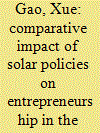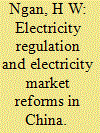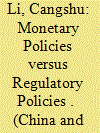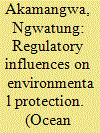| Srl | Item |
| 1 |
ID:
179694


|
|
|
|
|
| Summary/Abstract |
The relationship between energy policies and entrepreneurship has long been a keen interest of researchers and policymakers. This study seeks to understand whether and how public policies affect—promote or hinder—the founding of new firms by examining the impact of solar regulatory and financial incentive policies on two types of new firm formation (i.e., start-ups and new subsidiaries) in the U.S. solar photovoltaic (PV) installation industry. This study finds that favorable regulatory policies are associated with an increased number of 2.8 start-ups and 1.6 new subsidiaries, and restrictive regulations (i.e., licensing policies) are associated with 2 fewer start-ups and 0.5 fewer new subsidiaries in a state. This study also finds that third-party ownership policy seems to have no impact on new firm formation. Furthermore, the relationship between financial incentives and new firm formation is not robust. This study suggests that policies that create a favorable business environment (or increase the barriers to business entry) may benefit (or hinder) different types of firms to varying degrees, as firms may have different levels of motivations, incentives, resources, and capacity to leverage these policies. Therefore, the distributional implications of policies should be taken into account in policy designs.
|
|
|
|
|
|
|
|
|
|
|
|
|
|
|
|
| 2 |
ID:
094886


|
|
|
|
|
| Publication |
2010.
|
| Summary/Abstract |
The electricity industry of China has been in a process of reforms since the 1980s. This paper gives a review on the three main stages of reforms in China so as to trace out key features of various reform measures including those for power investment financing, the separation between government and power enterprises, and the division between power generation firms and power grids. The findings suggest that further regulatory change in China's electricity market reform is necessary when integration of the electricity markets and increased competition are paving the way ahead for a market-oriented structure. Prospective electricity regulation in the form of a strong legal system and effective institutions that protect market competition and promote appropriate incentives for efficiency are suggested in the paper.
|
|
|
|
|
|
|
|
|
|
|
|
|
|
|
|
| 3 |
ID:
132667


|
|
|
|
|
| Publication |
2014.
|
| Summary/Abstract |
The article focuses on the interplay between two factors giving rise to friction in bioenergy governance: profound value disagreements (e.g. the prioritizing of carbon concerns like worries over GHG emissions savings over non-carbon related concerns) and regulatory complexity (in terms of regulatory measures and options). We present ethical and legal analyses of the current stalemate on bioenergy governance in the EU using two illustrative cases: liquid biofuels for transport and solid biomass-based bioenergy. The two cases disclose some similarities between these two factors, but the remaining differences may partly explain, or justify, contrasting forms of governance. While there seems to be no easy way in which the EU and national governments can deal with the multiple sustainability issues raised by bioenergy, it is argued that failure to deal explicitly with the underlying value disagreements, or to make apparent the regulatory complexity, clouds the issue of how to move forward with governance of bioenergy. We suggest that governance should be shaped with greater focus on the role of value disagreements and regulatory complexity. There is a need for more openness and transparency about such factors, and about the inherent trade-offs in bioenergy governance.
|
|
|
|
|
|
|
|
|
|
|
|
|
|
|
|
| 4 |
ID:
125811


|
|
|
|
|
| Publication |
2013.
|
| Summary/Abstract |
The paper tracks the evolution of the Greek electricity market since the beginning of the liberalization process. Its progress is benchmarked against the criteria suggested by Littlechild (2006b). The Littlechild framework highlights key remaining deficiencies in the stances and policies adopted which need to be resolved in order for liberalization to proceed successfully. The focus is on the agendas of the Greek government, other domestic political forces and the European Union. A central requirement is the clear commitment to liberalization by the Greek government. In particular the government needs to give up political control over the previous vertically integrated, state-controlled electricity firm, Public Power Company (PPC), and allow more decision making powers and genuine independence to the market regulator. Liberalization is rendered more difficult by the present financial and economic crisis in Greece.
|
|
|
|
|
|
|
|
|
|
|
|
|
|
|
|
| 5 |
ID:
171880


|
|
|
|
|
| Summary/Abstract |
This paper studies how monetary and regulatory policies manage peer to peer (P2P) interest rates. Based on selected representative monetary and regulatory policies, this paper nds that easy monetary policies reduce the demand for online loans, thus reducing the market’s interest rates. Monetary policies may increase the supply of online loans through rational expectation channels or reduce the demand for online loans through bank risk-taking channels. Normative market-based regulatory policy enables the P2P market to return to rationality, eliminates high-risk investors and borrowers, and subsequently reduces market interest rates. Risk disposal-based regulatory policy reduces market supply to some extent, resulting in a small increase in interest rates. Both easy monetary policies and regulatory policies have a great impact on the normal platforms. The interest rate of high-risk platforms is less affected by the relevant policies, which is evidence that such platforms do not behave in accordance with the nancial rules in general. Monetary policies mainly affect platforms with interest rates in a relatively normal range, while regulatory policies mainly focus on platforms with abnormal interest rates.
|
|
|
|
|
|
|
|
|
|
|
|
|
|
|
|
| 6 |
ID:
152771


|
|
|
|
|
| Summary/Abstract |
This article reports the findings of an empirical study on the regulation of ship-source pollution at one United Kingdom-based global ship management company. In examining the corporate response of the case-study company, particular attention is given to the regulatory influences promoting such compliance as expressed in the views of company executives. The findings show that both legal regulatory pressures and customer demands are important factors in encouraging the company to comply with environmental requirements. However, the study also revealed that compliance with environmental requirements ultimately depends on the way in which individual companies adapt to different national regulatory and enforcement regimes.
|
|
|
|
|
|
|
|
|
|
|
|
|
|
|
|